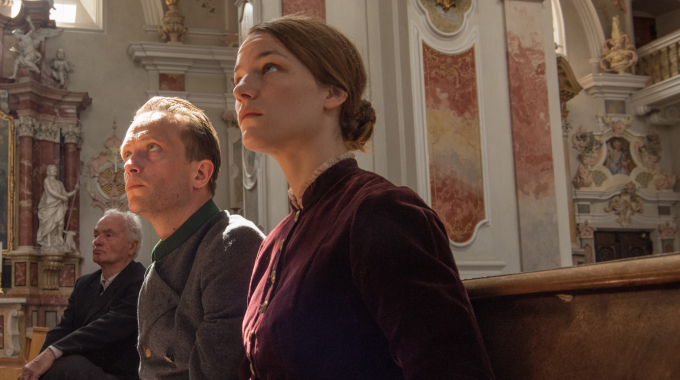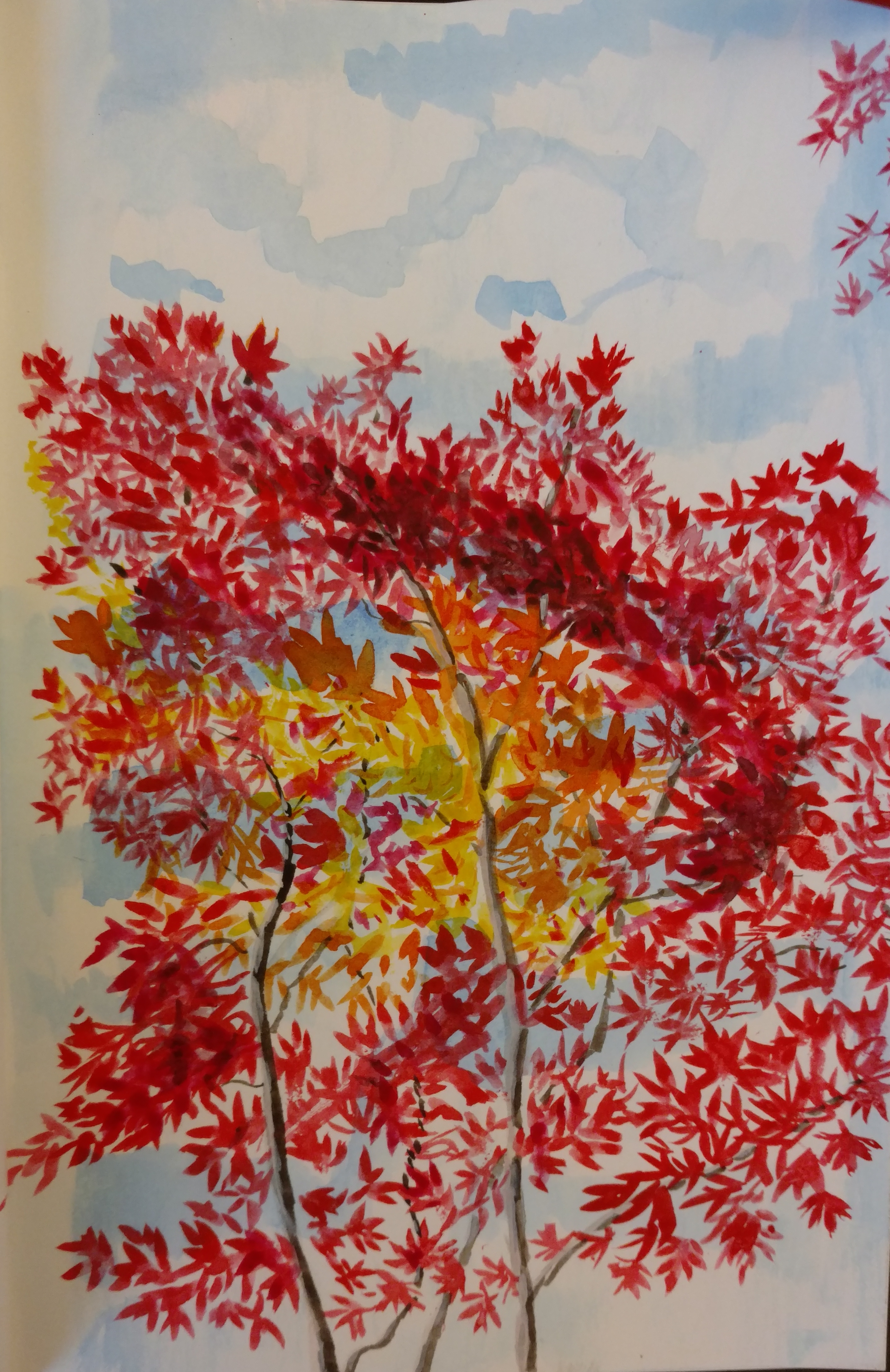About 35 minutes into Terrence Malick’s A Hidden Life (2019), we see Austrian dissident Franz Jägerstätter assisting a fresco painter in the small alpine church he serves as sexton. As he works, the painter muses:
I paint the tombs of the prophets. I help people look up from those pews and dream. They look up, and they imagine that if they had lived back in Christ’s time, they wouldn’t have done what the others did.
They would have murdered those whom they now adore. I paint all this suffering, although I don’t suffer myself; make a living of it. What we do is just create sympathy. We create, we create admirers. We don’t create followers.
Christ’s life is a demand. We don’t want to be reminded of it, so we don’t have to see what happens to the truth…I paint their comfortable Christ, with a halo over his head. How can I show what I haven’t lived? Someday I might have the courage to venture; I have not yet. Someday I’ll, I’ll paint a true Christ.
Several reviewers have seen the director himself in the Painter, with Franz’s holy suffering as his “true Christ.” Whether or not this is Malick’s intent, the scene is a turning point. From this day forward, Franz has set his face toward obedience to Christ’s hold on his conscience—he cannot, will not, swear loyalty to Hitler.
Jägerstätter resisted not simply the evils perpetrated by the Nazi regime, but the very idea that he could be compelled to swear an oath of complete loyalty to a human being in the place of God. He attacked the foundation (the führerprinzip) on which others based their trust in Hitler to bring prosperity and protect cultural “Christian” values. As a result, he endured the scorn of erstwhile friends and even family long before he faced the wrath of the state. He is today regarded as a martyr.
His life reminds us that action doesn’t always look the same as activism, but quiet, honest faithfulness in deliberate resistance to the spirit of anti-Christ is often the profoundest political act. His story, as told in Gordon Zahn’s In Solitary Witness is said to have inspired resistance to the Vietnam war in Muhammad Ali and Daniel Ellsberg among others.
A Costly Witness
Jägerstätter’s example provides a starkly drawn case, but whatever worldly system you find yourself in will eventually come into conflict with the grace-filled (chesed) system of God’s kingdom. The world, under the sway of Satan, doesn’t have a category for the covenant love of God (cf. Ex. 34:6-7) that He pours out on His people and its outworking in their community ethics (the Mosaic law, especially as exposited in the Sermon on the Mount and New Testament epistles). In this conflict, the way of life of the people of God is designed to contradict and convict the world’s systems so they could be transformed by the witness of the church.

More often the powers that be will demand that the church bow to them. Whether the demand to bow down comes in large ways (like Nebuchadnezzar’s image and furnace), small ones (the proverbial pinch of incense to Caesar), or the trivialities of being misunderstood and questioned by your neighbors and coworkers, it will come. The world forces the issue of faith. You can never isolate enough to avoid the confrontation.
The church’s call is to stand out enough that the confrontation is clear, living together in such a way as to silence the ignorance of evil men (1 Pet 2:15), and if we are called to suffer for the name and way of Jesus, we are to suffer as He did (1 Pet. 2:20-25).
But we do not like to suffer.
The Compromise of Christian nationalism
Not only do we dislike suffering, but we dislike getting anywhere near it. Wealth is attractive because it promises to insulate us from discomfort.
The slide starts with an implicit deal—the promise of peace and prosperity in exchange for silence about the violence against God and man inherent in the system. We grow accustomed to the prosperity, and before long, the church is willing to bless the violence so long as it gets to partake of the benefits. This is the shift at the heart of Christian nationalism.
If we find membership in any political party or allegiance to any government to be a more pressing concern than our adherence to all of Jesus’ teachings, we are well on our way down a dangerous road. When we find ourselves justifying our comforts and our political positions when the Spirit, through conscience and prophets, coaxes us to see and reject our idolatries, digging in our heels, we are in grave danger indeed.
Christian nationalism is a ready temptation for all of us, as it bubbles up from conflating God’s kingdom with our comfort, wealth, and power—even Jesus’ disciples were banking on it, after spending 3 years listening to His teaching and witnessing the clarifying events of his death and resurrection! As he prepares to ascend to the Father, their burning question is “Lord, are you at this time going to restore the kingdom to Israel?” (Acts 1:6).
The temptation will call out to us from any political direction, from the left and the right, in moderate or extreme positions, from imperialism, monarchy, republicanism, democracy, communism, oligarchy, anarchy, etc. The church of Jesus Christ can (and has, and does, and will) exist and even thrive under each of them. It cannot, however, fully and faithfully *co-exist* with any of them. Absolutizing any political position—even in the name of justice—makes politics an idol, not a tool. And a politically empowered idol becomes a cult.
Politics is Downstream from Desire
Christian nationalism doesn’t come knocking with a tract or appear on the street corner with a poster outlining its explicit aims (well, it did not used to). It is a subtle enemy, attacking from within—more like the favoritism condemned by James or the heresy of the judaizers than the wholesale persecution endured by our brothers and sisters in many countries.
It can sneak in because our politics is downstream from our desires. Political allegiances masquerade as righteousness, but are usually just emblematic of our idols. And our idols are always outworkings of our pride and greed—we follow after that which promises power & wealth. Our economic dreams are inseparable from our political actions.
See, for example, Solomon. He was supposed to be the great king, the promised Son of David who would build God’s house and reign in the promised land with wisdom, justice, and peace under the blessing of God—a picture of the coming, perfect, glorious reign of Jesus Christ over all the earth.
But Solomon longs for a more tangible “secure” blessing, something that has cash-value among his peers on the thrones of surrounding nations. While building the temple—which was designed to speak God’s glory to the nations (1 Kings 8:43)—he builds his own house to be even more magnificent (1 Kings 7). Against God’s commands (Deut. 17:14-20) he pursues military power (1 Kings 9), gold (1 Kings 10), and the lust of the flesh (1 Kings 11). These pursuits lead him to idolatry, and even enslavement of his fellow Israelites (1 Kings 9:15ff).
The Lord judges Solomon, in part by having the northern tribes rebel against him and his son Rehoboam. But the lesson continues—the rebellion could have been a righteous confrontation, exposing and addressing injustice. Indeed the separation is accomplished somewhat peacefully, with Rehoboam heeding God’s instruction not to fight through the prophet Shemaiah. Instead of resolution, though, the rebel leader Jeroboam decides he would rather hang on to his newfound power, setting up idols to keep people from going to Jerusalem to worship (1 Kings 12). The people of the Northern Kingdom never look back, doubling down on Jeroboam’s idolatry, and chasing after Ba’al and all manner of wickedness.
Lusting after wealth & power always leads us to sacrifice faithfulness. It’s a predictable progression. Lust leads to idolatry (spiritual failure) which leads to injustice (ethical failure). Injustice seeks justification, furthering idolatry, but in greater blindness. “Those who make [idols] will be like them” (Ps. 115:8). Idols demand sacrifice, but offer no blessing in return. In the same way, we demand ever-increasing sacrifices to our pride, which eventually comes out in political action to gain what we want from others and keep it.
Our Present Apocalypse
None of this repudiates legitimate petition of powers and authorities to do what they are called to do (to preserve the good and punish evil—Rom 13, etc.), but seeking to wield the worldly power of the sword under the aegis of “the people of God” is always going to go poorly. We need to cultivate a political theology of humility that recognizes that various temptations of Christian nationalism are always knocking at our door, hoping to be let in by our pride and overconfidence.
It will result, in the long run (and sometimes in an astonishingly short one) a church that looks less and less like Jesus, the embodiment of God’s mercy and provision, and more and more like the cutthroat, corrupt systems of the world.
In America, most churches are pretty deep into this ditch. My prayer—and it is a prayer not, sadly, a hope based in any empirical evidence—is that the current crisis (of Covid-19 and its disastrous economic effects) can catch us in our tracks, and lead our churches back to being communities that demonstrate God’s love in all our social and economic arrangements. I pray it may be a moment to take stock, to repent, and to rebuild in ways that show just how distinct the church is. I pray for a spiritual revival in our country, and with it a revival of justice and mercy in our churches, and how we interact with politics. This time is an apocalypse—unveiling the depth of cultural depravity in ways that I hope will not be allowed to ignore any longer.
The church needs to re-assert its distinctiveness from the world, boldly proclaiming an alternative witness against the status quo. This, I think, is precisely what Jesus speaks of in his statements about salt and light (Matt. 5:13-16). We are to season the world, to preserve God’s image & likeness in how we live among one another. We are to illuminate the world, to reveal injustice & light the path to restoration.
The salt without savor is a church in which the character of God has been pushed aside in favor of the characteristics of the world. The light under a bushel is a church that is not doing justly and loving mercy and so has nothing to offer to those seeking hope in the midst of oppression. If we think we’re upholding Christian values but see no conflict with worldly political power, we may already be worshipping the false god of Christian nationalism. That’s what Franz Jägerstätter was trying to teach us.
“Dear children, keep yourselves from idols” (1 John 5:21)—or as another John (Prine) sang, “your flag decal won’t get you into heaven anymore.”
Image: The church of St. Valentin in Seis am Schlern, Italy, used in filming A Hidden Life. Courtesy Fox Searchlight Pictures.







